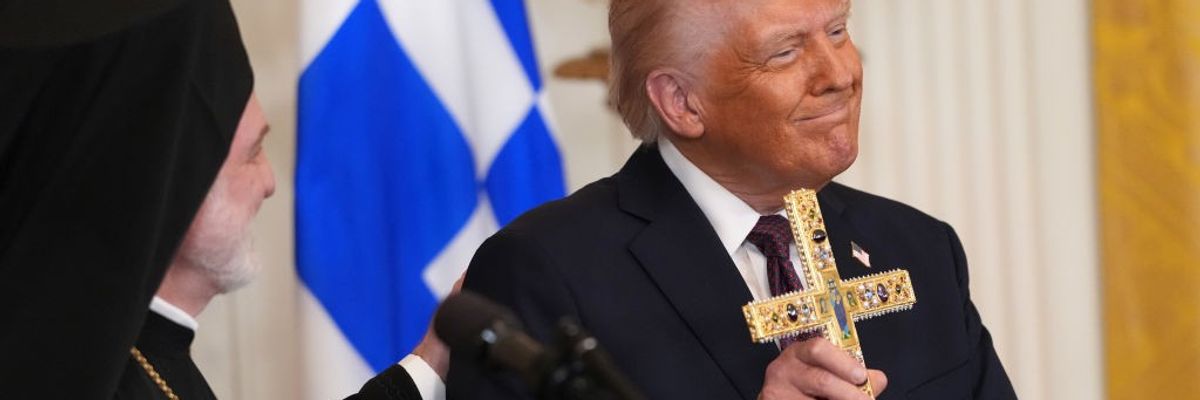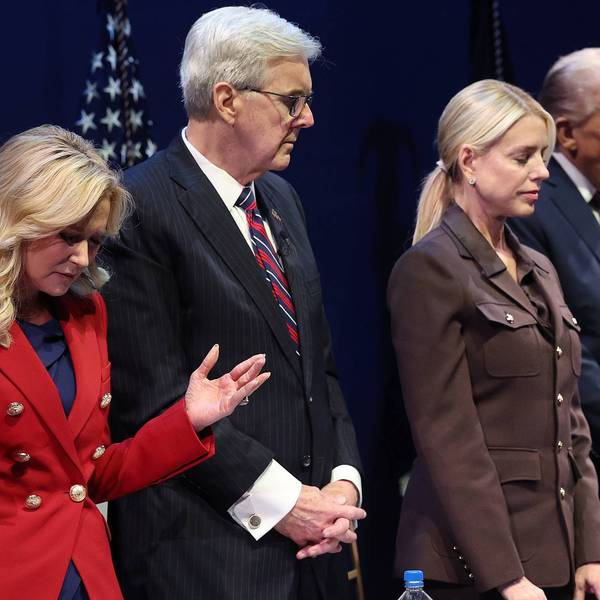
Archbishop Elpidophoros of the Greek Orthodox Archdiocese of America gives U.S. President Donald Trump a holy cross during a Greek Independence Day celebration at the White House on March 24, 2025 in Washington, D.C.
Group Fights 'Flagrant, Self-Serving Attack on Church-State Separation' by Trump IRS
"President Trump and his Christian nationalist allies are once again exploiting religion to boost their own political power," said the head of Americans United for Separation of Church and State.
Americans United for Separation of Church and State on Thursday took a step toward blocking a proposed settlement that would officially allow churches to endorse U.S. political candidates and retain their nonprofit, tax-exempt status.
The advocacy group's move came in response to a proposed settlement to a lawsuit brought by the National Religious Broadcasters and Intercessors for America and two Christian churches—Sand Springs Church and First Baptist Church Waskom—against the provision of the federal tax code that blocks such endorsements, the Johnson Amendment.
Rather than fully scrapping the policy named for former President Lyndon B. Johnson, the plaintiffs and Internal Revenue Service (IRS) on Monday filed a proposed settlement that would create an exception for houses of worship. Although the proposal would formalize a common practice, it was widely blasted as "dangerous for democracy."
Americans United (AU) is now requesting intervenor status in the case, writing to the U.S. District Court for the Eastern District of Texas—which can approve or reject the settlement—that "defendants have taken the consequential step of abandoning the defense of a federal law that has safeguarded our democracy for decades."
"The majority of Americans—including faith leaders, evangelical Christians, and Republicans—don't want their churches embroiled in the corrupting influence of partisan politics."
The filing explains that "as defendant-intervenor, Americans United will provide a critical perspective, including timely arguments opposing the proposed consent decree, that will otherwise be absent from this case and that will support this court's duty to reject entry of unlawful consent decrees."
"By preventing religious and other 501(c)(3) organizations from intervening in political campaigns, the Johnson Amendment protects their financial independence, ensuring that they are not corrupted by money and led astray from their intended missions," the document states. "That consideration applies to houses of worship and other religious entities just as much as to other nonprofits, and is in keeping with the fundamental principle underlying the separation of church and state: Religious freedom is best preserved by keeping religion apart from the corrupting influences of politics."
Ending the restriction on churches—which is rarely enforced by the IRS—has long been a priority for President Donald Trump. During his first term, in his 2017 address to the National Prayer Breakfast, he vowed to "get rid of and totally destroy the Johnson Amendment and allow our representatives of faith to speak freely and without fear of retribution."
AU president and CEO Rachel Laser said in a Friday statement that "the Trump administration's radical reinterpretation of the Johnson Amendment is a flagrant, self-serving attack on church-state separation that threatens our democracy by favoring houses of worship over other nonprofits and inserting them into partisan politics."
"President Trump and his Christian Nationalist allies are once again exploiting religion to boost their own political power. We're intervening in this case so we can urge the court to reject the administration's latest gambit to rewrite the law," Laser continued. "Americans United has long supported the Johnson Amendment because it protects the integrity of both our elections and nonprofit organizations, including houses of worship."
"The majority of Americans—including faith leaders, evangelical Christians, and Republicans—don't want their churches embroiled in the corrupting influence of partisan politics," she added. "Weakening this law would undermine houses of worship and nonprofits by transforming them into political action committees, flooding our elections with even more dark money."
An Urgent Message From Our Co-Founder
Dear Common Dreams reader, The U.S. is on a fast track to authoritarianism like nothing I've ever seen. Meanwhile, corporate news outlets are utterly capitulating to Trump, twisting their coverage to avoid drawing his ire while lining up to stuff cash in his pockets. That's why I believe that Common Dreams is doing the best and most consequential reporting that we've ever done. Our small but mighty team is a progressive reporting powerhouse, covering the news every day that the corporate media never will. Our mission has always been simple: To inform. To inspire. And to ignite change for the common good. Now here's the key piece that I want all our readers to understand: None of this would be possible without your financial support. That's not just some fundraising cliche. It's the absolute and literal truth. We don't accept corporate advertising and never will. We don't have a paywall because we don't think people should be blocked from critical news based on their ability to pay. Everything we do is funded by the donations of readers like you. Will you donate now to help power the nonprofit, independent reporting of Common Dreams? Thank you for being a vital member of our community. Together, we can keep independent journalism alive when it’s needed most. - Craig Brown, Co-founder |
Americans United for Separation of Church and State on Thursday took a step toward blocking a proposed settlement that would officially allow churches to endorse U.S. political candidates and retain their nonprofit, tax-exempt status.
The advocacy group's move came in response to a proposed settlement to a lawsuit brought by the National Religious Broadcasters and Intercessors for America and two Christian churches—Sand Springs Church and First Baptist Church Waskom—against the provision of the federal tax code that blocks such endorsements, the Johnson Amendment.
Rather than fully scrapping the policy named for former President Lyndon B. Johnson, the plaintiffs and Internal Revenue Service (IRS) on Monday filed a proposed settlement that would create an exception for houses of worship. Although the proposal would formalize a common practice, it was widely blasted as "dangerous for democracy."
Americans United (AU) is now requesting intervenor status in the case, writing to the U.S. District Court for the Eastern District of Texas—which can approve or reject the settlement—that "defendants have taken the consequential step of abandoning the defense of a federal law that has safeguarded our democracy for decades."
"The majority of Americans—including faith leaders, evangelical Christians, and Republicans—don't want their churches embroiled in the corrupting influence of partisan politics."
The filing explains that "as defendant-intervenor, Americans United will provide a critical perspective, including timely arguments opposing the proposed consent decree, that will otherwise be absent from this case and that will support this court's duty to reject entry of unlawful consent decrees."
"By preventing religious and other 501(c)(3) organizations from intervening in political campaigns, the Johnson Amendment protects their financial independence, ensuring that they are not corrupted by money and led astray from their intended missions," the document states. "That consideration applies to houses of worship and other religious entities just as much as to other nonprofits, and is in keeping with the fundamental principle underlying the separation of church and state: Religious freedom is best preserved by keeping religion apart from the corrupting influences of politics."
Ending the restriction on churches—which is rarely enforced by the IRS—has long been a priority for President Donald Trump. During his first term, in his 2017 address to the National Prayer Breakfast, he vowed to "get rid of and totally destroy the Johnson Amendment and allow our representatives of faith to speak freely and without fear of retribution."
AU president and CEO Rachel Laser said in a Friday statement that "the Trump administration's radical reinterpretation of the Johnson Amendment is a flagrant, self-serving attack on church-state separation that threatens our democracy by favoring houses of worship over other nonprofits and inserting them into partisan politics."
"President Trump and his Christian Nationalist allies are once again exploiting religion to boost their own political power. We're intervening in this case so we can urge the court to reject the administration's latest gambit to rewrite the law," Laser continued. "Americans United has long supported the Johnson Amendment because it protects the integrity of both our elections and nonprofit organizations, including houses of worship."
"The majority of Americans—including faith leaders, evangelical Christians, and Republicans—don't want their churches embroiled in the corrupting influence of partisan politics," she added. "Weakening this law would undermine houses of worship and nonprofits by transforming them into political action committees, flooding our elections with even more dark money."
- 'Dangerous for Democracy': Trump IRS Says Nonprofit Churches Can Make Political Endorsements ›
- Progressives Slam 'Extremist' Plans of Project 2025 Architect Tapped for Key Trump Post ›
- Theocratic Trump Tells Right-Wing Christians They Will Have Power at 'Level You've Never Used Before' ›
- 'The Bible Exposes Grifters': Trump Rebuked as Christian Nationalist 'Con Man' ›
- Christian Nationalist Insiders Are Prepping for Trump's 'Dystopian' Return ›
- 1,000+ Nonprofits Tell Trump: Cancel Plans to Let Churches Endorse Politicians | Common Dreams ›
Americans United for Separation of Church and State on Thursday took a step toward blocking a proposed settlement that would officially allow churches to endorse U.S. political candidates and retain their nonprofit, tax-exempt status.
The advocacy group's move came in response to a proposed settlement to a lawsuit brought by the National Religious Broadcasters and Intercessors for America and two Christian churches—Sand Springs Church and First Baptist Church Waskom—against the provision of the federal tax code that blocks such endorsements, the Johnson Amendment.
Rather than fully scrapping the policy named for former President Lyndon B. Johnson, the plaintiffs and Internal Revenue Service (IRS) on Monday filed a proposed settlement that would create an exception for houses of worship. Although the proposal would formalize a common practice, it was widely blasted as "dangerous for democracy."
Americans United (AU) is now requesting intervenor status in the case, writing to the U.S. District Court for the Eastern District of Texas—which can approve or reject the settlement—that "defendants have taken the consequential step of abandoning the defense of a federal law that has safeguarded our democracy for decades."
"The majority of Americans—including faith leaders, evangelical Christians, and Republicans—don't want their churches embroiled in the corrupting influence of partisan politics."
The filing explains that "as defendant-intervenor, Americans United will provide a critical perspective, including timely arguments opposing the proposed consent decree, that will otherwise be absent from this case and that will support this court's duty to reject entry of unlawful consent decrees."
"By preventing religious and other 501(c)(3) organizations from intervening in political campaigns, the Johnson Amendment protects their financial independence, ensuring that they are not corrupted by money and led astray from their intended missions," the document states. "That consideration applies to houses of worship and other religious entities just as much as to other nonprofits, and is in keeping with the fundamental principle underlying the separation of church and state: Religious freedom is best preserved by keeping religion apart from the corrupting influences of politics."
Ending the restriction on churches—which is rarely enforced by the IRS—has long been a priority for President Donald Trump. During his first term, in his 2017 address to the National Prayer Breakfast, he vowed to "get rid of and totally destroy the Johnson Amendment and allow our representatives of faith to speak freely and without fear of retribution."
AU president and CEO Rachel Laser said in a Friday statement that "the Trump administration's radical reinterpretation of the Johnson Amendment is a flagrant, self-serving attack on church-state separation that threatens our democracy by favoring houses of worship over other nonprofits and inserting them into partisan politics."
"President Trump and his Christian Nationalist allies are once again exploiting religion to boost their own political power. We're intervening in this case so we can urge the court to reject the administration's latest gambit to rewrite the law," Laser continued. "Americans United has long supported the Johnson Amendment because it protects the integrity of both our elections and nonprofit organizations, including houses of worship."
"The majority of Americans—including faith leaders, evangelical Christians, and Republicans—don't want their churches embroiled in the corrupting influence of partisan politics," she added. "Weakening this law would undermine houses of worship and nonprofits by transforming them into political action committees, flooding our elections with even more dark money."
- 'Dangerous for Democracy': Trump IRS Says Nonprofit Churches Can Make Political Endorsements ›
- Progressives Slam 'Extremist' Plans of Project 2025 Architect Tapped for Key Trump Post ›
- Theocratic Trump Tells Right-Wing Christians They Will Have Power at 'Level You've Never Used Before' ›
- 'The Bible Exposes Grifters': Trump Rebuked as Christian Nationalist 'Con Man' ›
- Christian Nationalist Insiders Are Prepping for Trump's 'Dystopian' Return ›
- 1,000+ Nonprofits Tell Trump: Cancel Plans to Let Churches Endorse Politicians | Common Dreams ›

